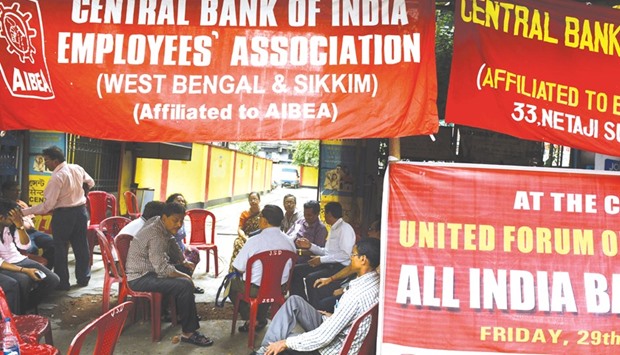Banking operations across the country were hit yesterday as around 10 lakh employees in around 40 private and nationalised banks struck work for a day to protest against the central government’s policies for the sector.
Unions in the banking sector had given the strike call to protest the mergers in the sector, infusion of private capital in government banks, for recovery of bad loans, bringing to book wilful loan defaulters and others.
“The strike has evoked a good response nationwide as around 10 lakh employees have participated in it. Most of the nationalised banks are closed,” CH Venkatachalam, General Secretary of the All India Bank Employees Association (AIBEA), told IANS in Chennai.
Echoing this, K Thamaraiselvan, General Secretary of Andhra Bank Employees Union (Tamil Nadu unit) said: “The banking operations have been paralysed nationwide.”
The strike call was given by the United Forum of Bank Unions (UFBU), an umbrella body of nine unions in the banking sector.
“The strike involved around 1mn employees and officers of public sector banks, old generation private banks and foreign banks totalling more than 80,000 branches,” Venkatachalam said.
The strike had its impact in the northeastern region as well.
“Over 10,000 bank employees belonging to more than 3,000 nationalised and private bank branches in the seven northeastern states took part in the strike, opposing the proposed amendments to the banking laws,” said UFBU spokesman Sushobhan Datta Majumder. “The proposed restructuring in the banking sector is expected to be undertaken aiming at mergers, acquisitions and outsourcing of routine activities of Indian banks and to allow foreign banks and investors in these activities and banking managements,” Majumder told reporters in Agartala.
A large number of the ATMs were closed, creating problems for the people in the northeastern states.
According to Venkatachalam, unmindful of the adverse implications, the government was pursuing the reform measures in the banking sector like inadequate infusion of capital in public sector banks, which will result in reduction of government’s equity capital and create compulsion for higher extent of private capital leading to privatisation of banks.
“In the last 40 years, more than 40 private banks have collapsed. We cannot allow to take that risk again. Banks must continue in public sector in national interest,” he said.
He said the government wants to consolidate and merge 27 public sector banks to make them into some five or six big banks for the sake of global competition.
“We need efficient banks and not necessarily big banks. Big banks do not automatically mean strong banks. In many countries big banks have failed and they are in trouble,” he added. Criminal action against wilful loan defaulters should be taken instead of dealing with them with a velvet hand, he added.

Indian bank employees sit next to the closed gates of a bank in Kolkata. Banking operations across India were hit as around hundreds of thousands of employees of private and nationalised banks stopped work for a day to protest against central government’s policies for the sector.
